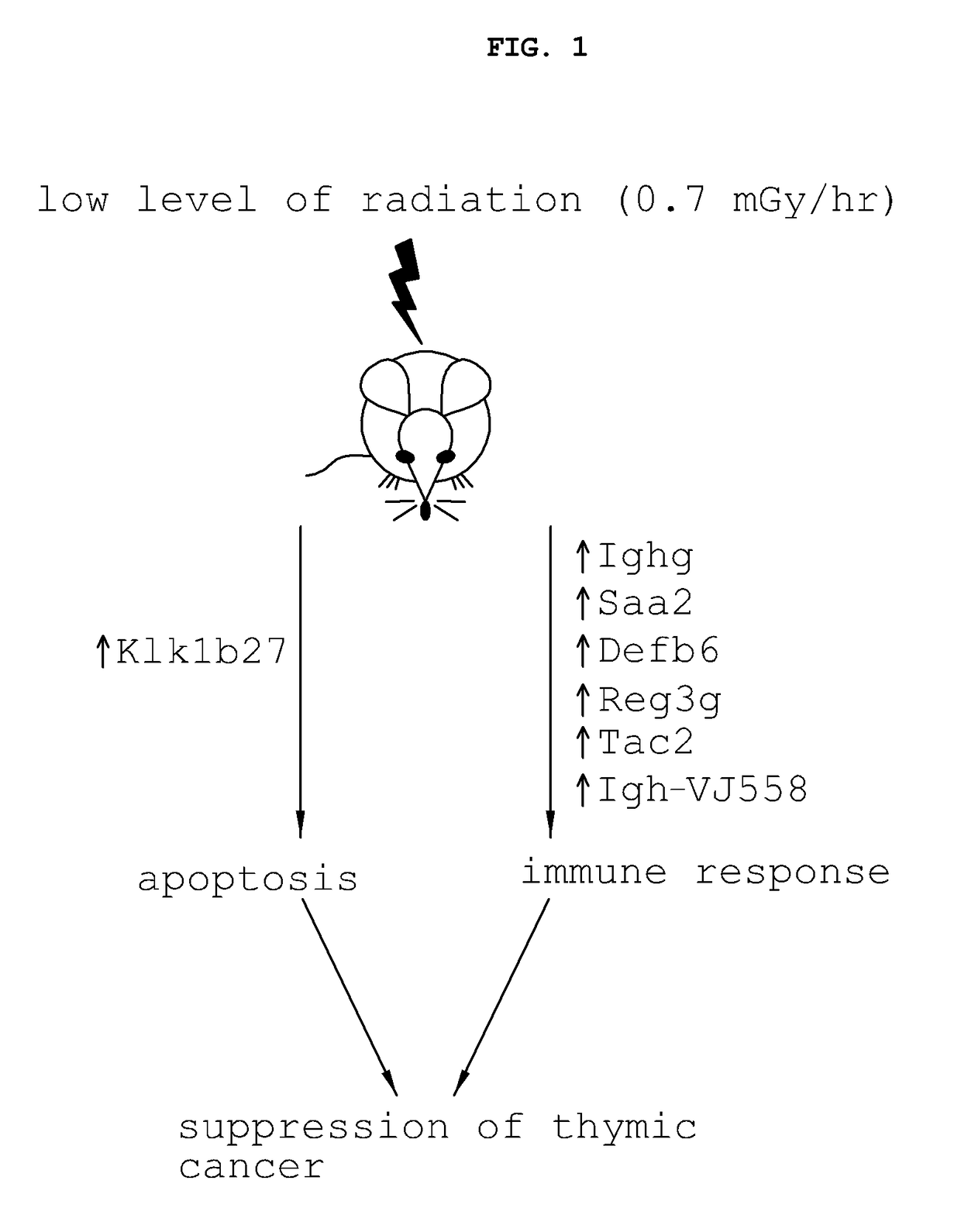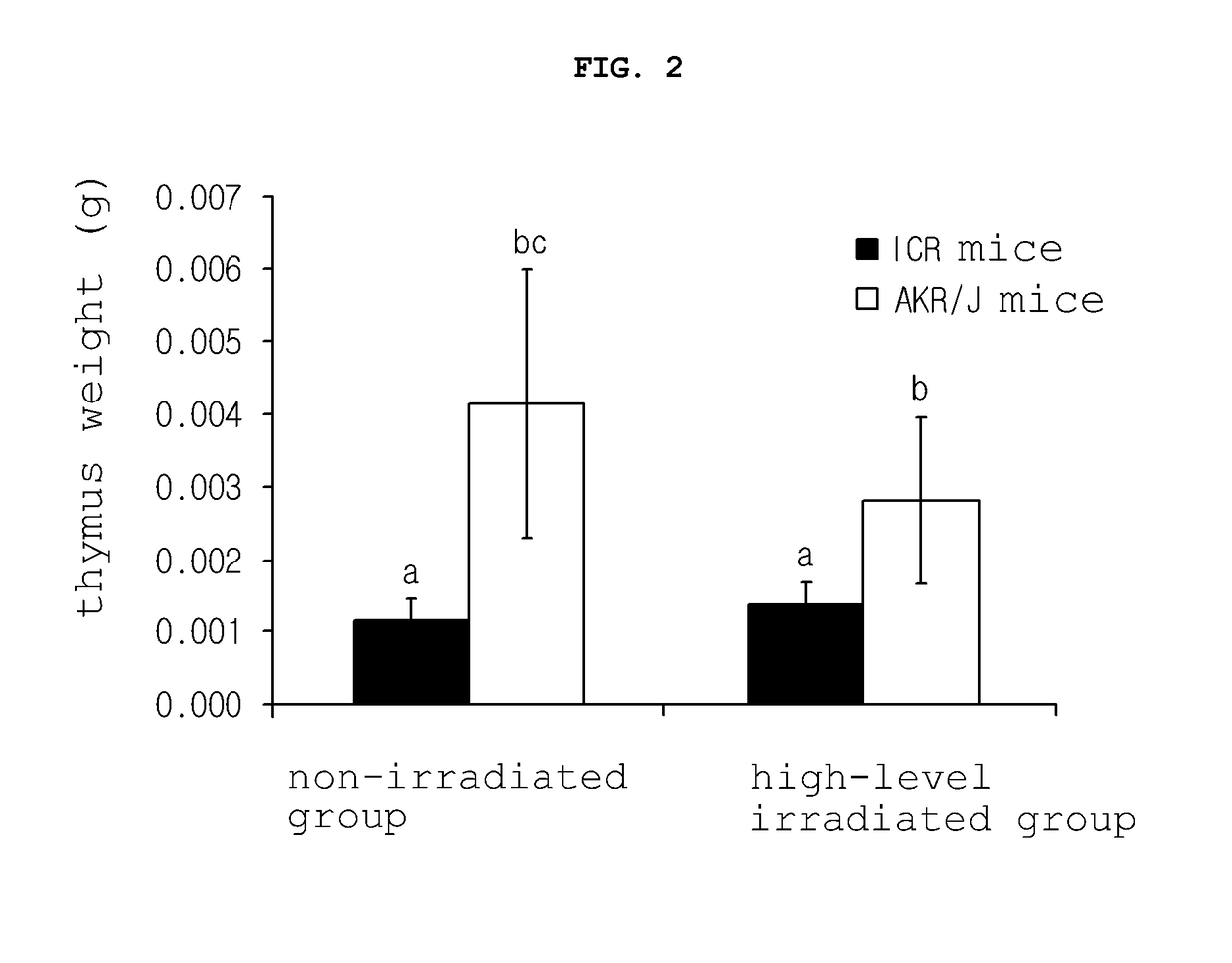Method for detecting genes sensitive to low-level ionizing radiation, and gene detected by the method
a technology of low-level ionizing radiation and detection method, which is applied in the field of detecting genes sensitive to a low-level ionizing radiation and genes detected by the method, can solve the problems of reducing reliability, difficult to analyze gene responses, and most studies conducted to date cannot explain various responses
- Summary
- Abstract
- Description
- Claims
- Application Information
AI Technical Summary
Benefits of technology
Problems solved by technology
Method used
Image
Examples
example 1
[0045]6-Week-old female AKR / J mice (models for thymic cancer research) and 6-week-old female ICR mice were purchased from SLC Co., Ltd. (Japan). A low level of radiation (137Cs) was irradiated to the AKR / J mice using a gamma-ray generator (IBL 147C, CIS bio international, France) at a dose rate of 0.7 mGy / hr) so as to reach a final dose of 1.7 Gy. After completion of irradiation with the low level of radiation, the mice were transferred into a sterilized housing system shielded from radiation, and were housed therein for 100 days while the observation of development of thymic cancer was performed. For gene analysis, under the same experimental conditions, normal mice (ICR mice) housed separately from the AKR / J mice were irradiated with a low level of radiation (0.7 mGy / hr). After 100 days, thymi were extracted from the mice and frozen rapidly in liquid nitrogen, after which gene analysis was performed.
example 2
y and Gene Analysis
[0046]Using mouse models (AKR / J mice) for cancer research, irradiated in Example 1, genes sensitive to a low level of radiation (0.7 mGy / hr) were screened. The screened genes were verified using normal mice (ICR mice). Specifically, genes that responded to a low level of radiation (0.7 mGy / hr) specifically in the thymi of the AKR / J and ICR mice irradiated with the low-level of radiation (0.7 mGy / hr) were screened, and their functions were analyzed. Analysis was performed using Venn diagrams, a quantitative nucleic acid amplification technique, and the statistical program SAS (ANOVA and t-test).
[0047]To confirm the results, the genes were subjected to nucleic acid amplification. Specifically, the thymi extracted from the AKR / J and ICR mice irradiated with the low level of radiation (0.7 mGy / hr) were microarrayed, and genes that responded sensitively to the low level of radiation were amplified using the primers shown in Table 1 below in order to measure the express...
PUM
| Property | Measurement | Unit |
|---|---|---|
| time | aaaaa | aaaaa |
Abstract
Description
Claims
Application Information
 Login to View More
Login to View More - R&D
- Intellectual Property
- Life Sciences
- Materials
- Tech Scout
- Unparalleled Data Quality
- Higher Quality Content
- 60% Fewer Hallucinations
Browse by: Latest US Patents, China's latest patents, Technical Efficacy Thesaurus, Application Domain, Technology Topic, Popular Technical Reports.
© 2025 PatSnap. All rights reserved.Legal|Privacy policy|Modern Slavery Act Transparency Statement|Sitemap|About US| Contact US: help@patsnap.com


